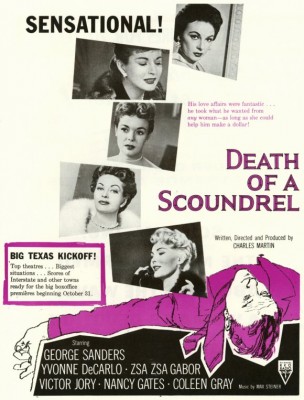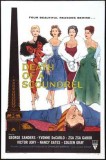| Reviews & Columns |
|
Reviews DVD TV on DVD Blu-ray 4K UHD International DVDs In Theaters Reviews by Studio Video Games Features Collector Series DVDs Easter Egg Database Interviews DVD Talk Radio Feature Articles Columns Anime Talk DVD Savant Horror DVDs The M.O.D. Squad Art House HD Talk Silent DVD
|
DVD Talk Forum |
|
|
| Resources |
|
DVD Price Search Customer Service #'s RCE Info Links |
|
Columns
|
|
|
Death of a Scoundrel
An all-region Warner Archive Collection, manufactured-on-demand (MOD) DVD, Death of a Scoundrel gets a decent 1.85:1 enhanced widescreen transfer. No extras.
In a luxurious Manhattan mansion, Bridget Kelly (Yvonne De Carlo) finds disgraced financier Clementi Sabourin (George Sanders) dead on his bed, his dead eyes gazing straight into the camera in an impressively long, unbroken take. In the nearby bedroom belonging to Sabourin's ailing mother (Celia Lovsky), Kelly tells homicide detective Capt. LaFarge (Morris Ankrum) Sabourin's life story, and the rest of the film unfolds in flashback. (She claims to have knowledge about how he died, but much of what she tells the police she couldn't possibly have known.)
Having spent the war in a Nazi prison camp in Czechoslovakia, after the war Sabourin is anxious to reunite with his long-lost lover, Zina (Lisa Ferraday), now living in South America. Instead he discovers that she has married Sabourin's brother, Gerry Monte (Tom Conway, Sanders's real-life older brother) and that they've used Sabourin's money to open an antique shop. Enraged, in exchange for a visa to the United States, Sabourin tells local, corrupt police about his brother's illegal immigration status and hidden cash, and police murder him for his loot.
In America, Sabourin becomes involved with petty thief (and coded prostitute) Bridget Kelly, who steals the wallet of oil baron Leonard Wilson (Victor Jory) after he accidentally drops it. Her boyfriend/pimp Chuck (Bob Morgan, his character inexplicably also called "Jack" in the film) shoots Sabourin, wounding him, but Jack is then immediately run over by a truck and killed. (This is dramatized via an impressive, startling bit of stunt work.) Taken to a nearby doctor, Sabourin learns from him that a revolutionary new drug called penicillin will be formally announced the following day. And so, using a cashier's check found in Wilson's wallet, Sabourin buys $20,000 worth of pharmaceutical shares from broker O'Hara (John Hoyt), later Sabourin's partner in crime.
While earning an instant $100,000, at the brokerage firm Sabourin meets wealthy widow Mrs. Ryan (Zsa Zsa Gabor, Sanders's ex-wife and future sister-in-law). Later still he becomes involved with Edith Van Renassalear (Coleen Gray), wife of a wealthy department store owner; and Stephanie North (Nancy Gates), Ryan's secretary and an aspiring actress. Later, Sabourin bullies some Broadway producers into casting her in the lead role of their struggling show.
Despite an impressive/alarming cast of character stars and also-rans (Sanders, Gabor, De Carlo, Gray, Jory, Conway, et. al.), Death of a Scoundrel never comes to life and is dull and flat when not embarrassingly bad. Rather than trading on Sanders's DeWitt character, the screenplay is specifically based, all resemblances "purely coincidental" aside, on notorious swindler Serge Rubinstein. The Bernie Madoff of his time, Rubinstein like Sabourin was found dead, murdered, in his luxurious Manhattan home, possibly by one of his many girlfriends. (The case was never solved.)
But instead of playing Sabourin as the king of cads, the script by Charles Martin, who also produced and directed Death of Scoundrel, envisions Sabourin as weasely manipulative and spineless, Lost in Space's Dr. Smith-as-Ponzi-schemer. Where Addison DeWitt was cool and sharp-tongued, Sabourin is merely a self-serving, sniveling coward, and for that reason not any fun to watch. He sells out his brother on a whim, getting all wide-eyed and panicky in the process, and later, when he pleads with Zina not to kill him, Sanders is totally unconvincing, like a first-time actor in community theater.
Besides the illogical structure of having one character tell Sabourin's story, including things she could not possibly have known about*, Death of a Scoundrel is strange and nonsensical in others ways. For instance, Czech-French Sabourin's velvety British accent is explained in a line that Sabourin had attended Oxford, but what about his sound alike brother? The film's ideas of high finance are often ridiculous: "I want to find out what Broadway shows need money!" Sabourin demands in one such scene. The dialogue is trite without being over-the-top funny: "Don't moralize with me, you tramp!"
Charles Martin had a strange, unaccountable career. He seems to have been a playwright first, best known perhaps for I'll Be Seeing You, which was later adapted into a successful film. That may have launched his intermittent career as a writer-director that began with No Leave, No Love (1946), an MGM production with Van Johnson, and My Dear Secretary (1948), an indie for United Artists starring Kirk Douglas. He directed no other films until Death of a Scoundrel eight years later, and nothing after that until the misbegotten If He Hollers, Let Him Go! in 1968.
Max Steiner wrote the score, one as overripe as the picture itself, while legendary DP James Wong Howe's cinematography is, atypically, flat and uninteresting.
Video & Audio
Part of Warner Home Video's manufactured on demand program, billed under the "Warner Archive Collection" banner, Death of a Scoundrel is presented in 1.85:1, 16:9 enhanced widescreen. RKO titles tend to be a little dog-eared, and this is no exception, though the presentation is basically fine and the widescreen image helps a bit. The mono audio (English only, no subtitles) is adequate. The disc is region-free.
Extra Features
None.
Parting Thoughts
Hardcore fans of George Sanders may want to see this, but I found it a big disappointment, despite interesting components, and thus advise you to Rent It before buying.
* Not only does she bore them with Sabourin's long-winded life story, at the end the film cuts back to Capt. LaFarge and the other detective listening all this time. They're not only still standing, two hours later, they're in exactly the same position as when the story began.
Stuart Galbraith IV's latest audio commentary, for AnimEigo's Musashi Miyamoto DVD boxed set, is on sale now.
|
| Popular Reviews |
| Sponsored Links |
|
|
| Sponsored Links |
|
|
| Release List | Reviews | Shop | Newsletter | Forum | DVD Giveaways | Blu-Ray | Advertise |
|
Copyright 2024 DVDTalk.com All Rights Reserved. Legal Info, Privacy Policy, Terms of Use,
Manage Preferences,
Your Privacy Choices | |||||||
















